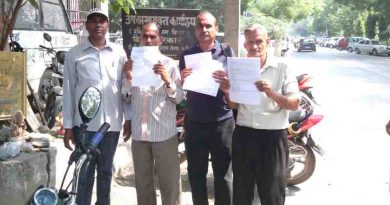American Lawyers Demand the Release of Delhi Student Safoora Zargar

Ms. Zargar has been detained pre-trial for seven months despite the fact that she is pregnant and therefore at higher risk of contracting Covid-19 in the crowded prison in which she is detained.
By Rakesh Raman
The American Bar Association (ABA) – a high-profile group of American lawyers – has expressed deep concern over the detention of a university student by the Indian authorities through Delhi Police.
Based on a preliminary review of the proceedings to date, the ABA Center for Human Rights released a report Friday (June 12) which argues that her detention does not appear to meet international human rights standards.
Safoora Zargar, 27, a research student from Jamia Millia University was arrested on 10 April by the Delhi Police and later charged under the repressive Unlawful Activities (Prevention) Act (UAPA).
According to human rights organization Amnesty International India, Safoora who is also pregnant is accused by the police of being a key ‘conspirator’ in the Delhi riots that took place in north-eastern part of the capital city in February.
Before the riots, Safoora, as part of the Jamia Coordination Committee (JCC), had been organizing peaceful protests against the Citizenship (Amendment) Act (CAA).
The Amnesty report reveals that she is currently imprisoned in Tihar jail which is one of the most overcrowded prisons in the country and has not been able to access her lawyer or meet her husband since 14 April.
According to Amnesty, Safoora’s pregnancy is a mitigating factor against her continued detention under UAPA, particularly amidst the Covid-19 pandemic.
On December 13, 2019, according to the ABA report, Delhi Police responded with force to a reportedly non-violent protest that was occurring at Jamia Millia Islamia University in New Delhi, India.
The ABA report adds that at the end of February 2020, the Indian police charged Ms. Safoora Zargar, a protest volunteer and research scholar at the university, with causing disturbances during the protests. Ms. Zargar has been detained pre-trial for seven months despite the fact that she is pregnant and therefore at higher risk of contracting Covid-19 in the crowded prison in which she is detained.
On April 13, according to the ABA report, a magistrate granted Ms. Zargar’s bail request citing “her pregnancy, health condition, and the directives issued by the Indian Supreme Court on decongestion of prisons during Covid-19” as reasons for the decision.
Immediately thereafter, however, she was rearrested on new charges which eventually included non-bailable UAPA offenses, and was sent back to prison where she remains today. A subsequent request from Ms. Zargar’s counsel for bail was rejected on April 21 without providing justification for her continued detention.
Further, the ABA report adds that Ms. Zargar was denied bail once more on June 4 in an order made public by the court. In addition to her legal issues, Ms. Zargar has also been the victim of a slanderous online campaign, including falsified and explicit images of her being shared online and through WhatsApp messenger.
The Delhi Commission for Women has demanded that the Delhi Police Cyber Cell take immediate action to file charges against Ms. Zargar’s online attackers and bring them to justice in accordance with Indian law.
Given the lack of clear evidence of criminal conduct, her pregnant condition, and the failure of prosecutors to specifically explain how Ms. Zargar poses a threat if granted bail, the ABA report suggests that Ms. Zargar should be given the opportunity to furnish a bail bond and be in her home with her family until the appropriate time for her legal hearings.
The Center urges the Court to uphold India’s moral and legal obligations given the pandemic and order the immediate release of Mrs. Zargar.
The ABA Center for Human Rights monitors trials around the world concerning human rights defenders to encourage compliance with fair trial standards. According to the Center, this preliminary report on the arrest of Ms. Zargar will be updated as the trial progresses.
By Rakesh Raman, who is a national award-winning journalist and social activist. He is the founder of a humanitarian organization RMN Foundation which is working in diverse areas to help the disadvantaged and distressed people in the society. He also creates and publishes a number of digital publications and research reports on different subjects. These publications include the “Covid Health Bulletin” that covers global coronavirus news and views.





